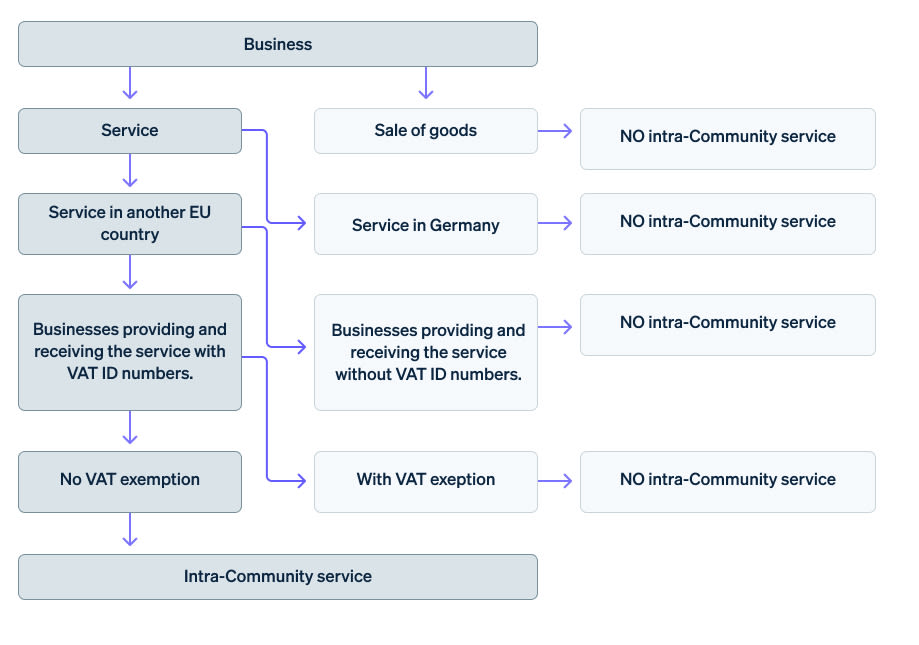向境外提供服务的企业需密切关注增值税 (VAT) 相关规定。本文将介绍什么是欧盟内部服务、欧盟内部服务应在何处征税,同时解释背后的反向征税程序及强制提交的汇总表要求。此外,还将概述欧盟内部服务发票需包含哪些信息。文末提供了决策树,帮助企业判断自身是否提供欧盟内部服务。
本文内容
- 什么是欧盟内部服务?
- 欧盟内部服务在哪些方面需要征税?
- 什么是反向征税程序?
- 欧盟内部服务发票需包含哪些强制信息?
- 什么是汇总申报表?
- 企业何时提供欧盟内部服务?
什么是欧盟内部服务?
欧盟内部服务是指企业在另一个欧盟国家提供的服务。服务提供方和接收方均需为拥有增值税税号的企业,且需在欧盟成员国注册,但注册国家不同。“欧盟内部服务” 是增值税相关术语,与欧盟内部商品销售不同——后者适用于商品买卖场景。
欧盟内部服务归为“其他服务”类别,需依据以下法规进行交易:
- 关于统一增值税制度的《欧盟理事会第 2006/112/EC 号指令》
- 就发票开具规则修订关于统一增值税制度的《欧盟理事会第 2006/112/EC 号指令》的《欧盟理事会第 2010/45/EU 号指令》
欧盟内部服务在哪些方面需要征税?
德国企业向其他欧盟国家企业提供的欧盟内部服务,若在德国境内提供且收取费用,且无免税情形的,需缴纳德国增值税。德国企业符合《德国增值税法》(UStG) 第 19 条规定的小型企业规则等情形的,可享受免税待遇。此外,特定金融服务或与航空、海运相关的销售等情形(参见《德国增值税法》第 4 条),也适用免税规定。
但若服务提供地位于德国境外的其他欧盟国家,则该服务无需在德国征税。若服务在多个国家提供,需准确确定相关服务提供地——通常以接收服务企业的注册地址为准。此类情况下,适用反向征税程序。
什么是反向征税程序?
反向征税程序是针对欧盟内部跨境服务的特殊规则。例如,若德国企业在另一个欧盟国家提供服务(即服务提供地不在德国,而在该欧盟国家),原则上该服务需在服务接收方所在国缴纳增值税。此时,德国企业需向该国税务局缴纳增值税。而反向征税程序的推出,主要是为了为企业减轻这一行政负担。根据该机制,增值税纳税义务发生转移——即无需开具发票的德国企业缴纳税款,而是由服务接收方在其本国缴纳税款。
关于服务及服务提供地的不同规定
反向征税程序存在一些与服务类型或服务提供地相关的例外情形,包括:
电子服务: 电子服务需在服务接收方所在国征税,其中包括广播、电视和电信服务。
运输租赁: 履约地根据运输工具(如车辆或拖车)的租赁时长确定。若为最长 30 天的短期租赁,履约地为车辆交付地点;若为长期租赁,履约地为接收方公司所在地。
交易会和餐饮服务: 与展会相关的服务,需在展会举办国征税——即便其他欧盟国家的企业使用此类服务也是如此。展会、展览会及会议的入场权授予,同样适用这一规定。餐饮服务需在食品和饮料提供地征税。
欧盟内部服务发票需包含哪些强制信息?
企业开具的欧盟内部服务发票,需包含《德国增值税法》第 14 条第 4 款规定的强制信息:
- 开票方的名称及地址
- 开票方的税号
- 开票方的增值税税号
- 发票接收人的名称和地址
- 发票开具日期
- 提供服务的时间和日期
- 发票序列号
- 服务名称
- 服务类型和范围
- 净额(注:无需注明税率和总额)
开具欧盟内部服务发票时,需注意以下三点:
- 除开票方的增值税登记号外,发票还需包含服务接收方企业的增值税登记号。若存在疑问,需向相关企业索取该编号。若发票上未注明该编号,增值税纳税义务将由开票方承担,开票方可能需向其所属税务局补缴税款。
- 若企业计划享受免税待遇,必须核实增值税登记号的准确性。核实可通过德国联邦中央税务局 (BZSt) 门户网站,或[使用欧盟委员会的增值税信息交换系统 (VIES) 完成](https://europa.eu/youreurope/business/taxation/vat/check-vat-number-vies/index_en.htm "europa.eu | Your Europe. Überprüfung einer Mehrwertsteuernummer (MIAS)。
- 发票上还需注明免税或适用反向征税程序的文字说明。德国发票上的相关标注为:“Umsatzsteuerschuldnerschaft des Leistungsempfängers”(即“服务接收方承担增值税纳税义务”)。
欧盟官方语言的发票标注
以下列出了欧盟各官方语言对应的免税标注:
- 保加利亚语: обратно начисляване
- 克罗地亚语: prijenos porezne obveze
- 捷克语: daň odvede zákazník
- 丹麦语: omvendt betalingspligt
- 荷兰语: btw verlegd
- 英语: reverse charge
- 爱沙尼亚语: pöördmaksustamine
- 芬兰语: käännetty verovelvollisuus
- 法语: autoliquidation
- 希腊语: aντίστροφη επιβάρυνση
- 匈牙利语: fordított adózás
- 意大利语:inversione contabile
- 拉脱维亚语: nodokļa apgrieztā maksāana
- 立陶宛语: atvirktinis apmokestinimas
- 马尔他语: inverżjoni tal-ħlas
- 波兰语: odwrotne obciążenie
- 葡萄牙语: autoliquidação
- 罗马尼亚语: taxare inversă
- 斯洛伐克语: prenesenie daňovej povinnosti
- 斯洛文尼亚文: povratna bremenitev
- 西班牙语: Inversión del sujeto pasivo
- 瑞典语: omvänd betalningsskyldighet
企业可借助经认证的支付服务提供商的服务,确保开具的发票符合法律规定。这些公司不仅提供自动化流程,还提供智能发票开具程序,将错误率降至最低(包括欧盟内部服务发票)。
什么是汇总申报表?
根据《德国增值税法》(UStG) 第 18a 条规定,提供欧盟内部服务的企业,一项重要义务是定期向税务局申报相关销售额。申报需以“汇总表”形式提交,列出所有欧盟内部服务,并通过电子方式提交(在德国,需通过 ELSTER 门户网站提交)。汇总表通常按季度提交;但若三个月内欧盟内部服务金额超过 5 万欧元,则需按月提交。申报截止日期为次月 25 日。
但既然境内公司因采用“反向征税程序”基本无需缴纳增值税,为何仍需提交这份报告?该规则的适用对象是交易另一方(即接收服务/货物的公司),这类公司需在其所在国缴纳相应增值税。而参与信息交换的欧盟各国税务机关,可通过“汇总申报表”核查企业是否就相关交易足额缴纳了税款。
企业何时提供欧盟内部服务?
以下决策树列出了判断企业是否提供欧盟内部服务的关键标准。

本文中的内容仅供一般信息和教育目的,不应被解释为法律或税务建议。Stripe 不保证或担保文章中信息的准确性、完整性、充分性或时效性。您应该寻求在您的司法管辖区获得执业许可的合格律师或会计师的建议,以就您的特定情况提供建议。